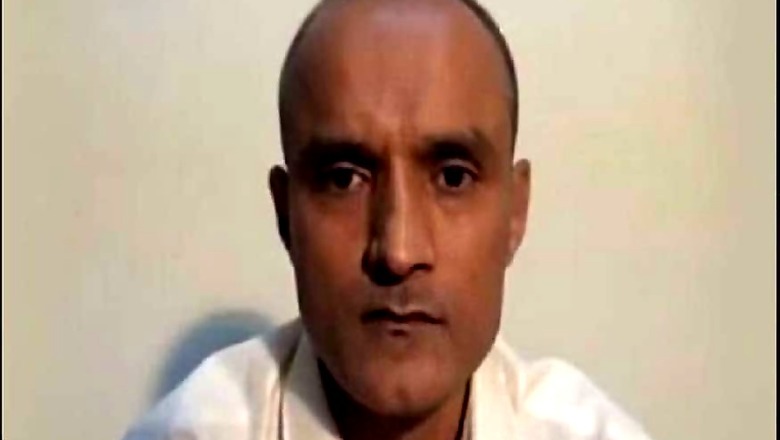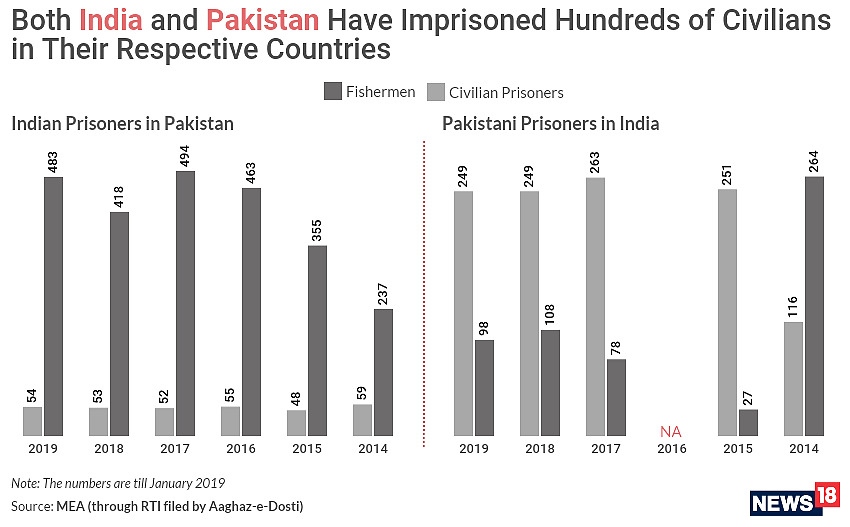
views
New Delhi: The four-day hearing of Kulbushan Jadhav’s case opened Monday at the International Court of Justice (ICJ) headquarters in The Hague amid high tensions between India and Pakistan after the Pulwama attack in which more than 40 CRPF men were killed.
Jadhav, a former Indian Navy officer, was awarded the death sentence by a Pakistani military court under Pak Army Act-59 (PAA- 59) on charges of espionage. India has, however, maintained that Jadhav is innocent of all charges.
However, Jadhav is not the only Indian national lodged in Pakistani jail under charges of espionage. Latest data provided by the Ministry of External Affairs (MEA) through RTI filed by Mission Bhartiyam under Aagahaz-e-Dosti initiative shows that at least 537 Indian citizens or those believed to be Indians are languishing in Pakistani jails under various charges.
Among these, 54 are civilians charged under various acts and 483 are fishermen who had ventured into Pakistani waters inadvertently.
But the case is not one–sided. At least 347 Pakistani citizens or those believed to be Pakistani citizens, including 249 civilians charged under various acts and 98 fishermen who had crossed into Indian waters, are in Indian jails. Most of these Pakistani prisoners are charged for alleged terrorism-related activities in Jammu and Kashmir.
An analysis of the RTI replies from the MEA to Mission Bhartiyam since 2014 reveals some important details about civilians jailed in both countries.
The data shows that severe punishments were awarded to Indian prisoners under PAA-59, Foreign Act, Security of Pakistan Act and Officials Secrets Act. As per available data till July 2017, at least 11 Indian civilians were booked under PAA-59 on charges of espionage.
In India, severe punishments have been awarded to Pakistani nationals under Foreigners Act-23, Official Secret Act, Explosive Act, Arms Act, IPC Section 121 & 121 A, 120 B, 122, 123, 124 A and NDPS Act. A significant number of Pakistani nationals are also lodged in Indian jails allegedly for “residing in India without passport and visa”.
As per July 2017 data, there are 15 Pakistani civilians against whom no offence was registered, yet they were under arrest.

Till July 2017, out of a total of 52 Indian civilians who were imprisoned in Pakistani jails, one prisoner was awarded death sentence. Among them, 48 had completed their sentence. Their identity, however, could not be confirmed.
On the Indian side, among the 263 Pakistani civilians, two were awarded death sentence. Seventy-one others had completed their sentence till July 2017. Nationality status of 310 and 75 Indian and Pakistani fishermen, respectively, was not confirmed.
The issue of pendency of confirmation about the nationality of prisoners is consistently observed since 2014. Since all data has not being provided through RTIs in 2018 and 2019, it is also not confirmed as to how many prisoners of both countries who completed their sentence have been released.
However, on December 19, 2018, External Affairs Minister Sushma Swaraj told Parliament that as many as 1,557 Indians have been released from various prisons in Pakistan, whereas a total of 318 Pakistanis were freed from Indian jails in the last four years.
Replying to a question, she also told that a total of 174 Indian fishermen were released from Pakistan in 2018 (as on December, 13) while 28 Pakistani fishermen were released in India in the same year.
Every once in a while both countries have released fishermen who crossed the unmarked sea boundaries as a mark of goodwill. However, citizens booked under espionage in particular are only released after completion of their sentence.
An analysis of the available data also showed that the MEA earlier used to provide statistics about under-trial prisoner data, sentence completion, and charges under which the prisoners were booked till 2018. However, since 2018 there is no data available about the segregation of prisoners who are lodged in India and Pakistan, respectively.
Speaking to News18.com, Ravi Nitesh, founder of Mission Bhartiyam said, “Governments on both sides need to pay attention with humanitarian approach to provide fishermen and prisoners relief and better legal assistance. Indo-Pak judicial committee must be revived, and details of these prisoners and fishermen should be on a government portal. Documentation and bureaucratic delay must be minimised, particularly in cases where people are in jail due to reasons like nationality confirmation.”
Nitesh also emphasised that prisoners on both sides should have an opportunity of speedy trials in special court to avoid legal delay.
“For fishermen, I believe that they must not be detained for any undefined duration. Fishermen on both sides must be released along with their boats with minimum penalty as defined under UN sea laws,” he added.
On the issue of data transparency, he said, “Since 2018, Government of India is not providing complete information on prisoners lodged in Pakistan. It may or may not be intentional, but the government must know that making complete information public would only bring more transparency, and families, scholars and advocates would be able to reach the needy people on both sides to provide assistance. History knows that many such cases, with the intervention of civil society, have been resolved with coordination from the government.”




















Comments
0 comment